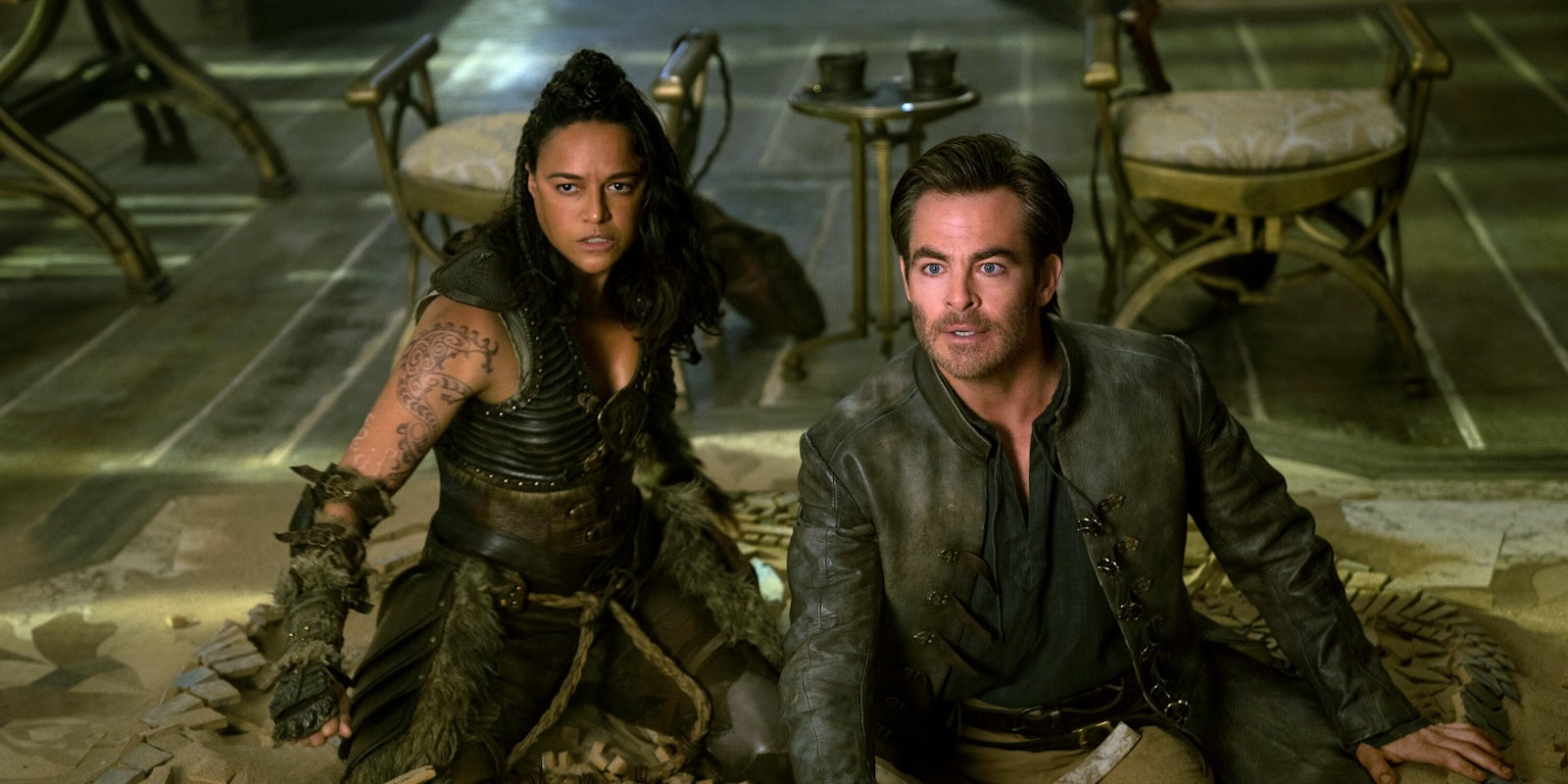Against all expectations, the new Dungeons and Dragons movie is the feel-good hit of the season. In many ways a standard type of family blockbuster, it stands out in two key areas: Sincere, unironic engagement with its goofy source material, and laugh-out-loud comedy.
Written and directed by comedy filmmakers (the team behind Game Night), Honor Among Thieves has an astonishing joke-per-scene ratio compared to other franchise blockbusters. Its surprise MVP is Bridgerton hunk Regé-Jean Page, playing a side character who helps the main squad on their quest—a meandering plot that follows the structure of a D&D game while still being accessible to normie audiences.
Across the board, Honor Among Thieves’ casting works on both a comedic level and as an homage to D&D itself. Representing a variety of classic D&D archetypes, the main characters are a group of incompetent thieves trying to pull a heist. Almost everyone involved is deeply silly, from Hugh Grant as the egomaniacal conman villain to Michelle Rodriguez parodying her career of tough-as-nails typecasting. Leading the team as a fast-talking bard, Chris Pine exhibits an enthusiastic willingness to be the butt of the joke—a necessary quality for all great leading men, absent in far too many current stars.
Above all though: Regé-Jean Page. His role echoes the kind of non-playable characters who appear partway through a D&D game to assist the heroes through a tricky subplot. As the immortal paladin Xenk Yendar, his job is to be unfeasibly perfect and utterly humorless. He’s a legendary hero with dazzling combat skills and a wealth of plot-relevant knowledge. He delivers every line in tones of heartfelt moral seriousness, usually while soulfully into someone’s eyes.
In other words, the ideal foil for a bunch of squabbling, disaster-prone criminals. He’s the straight man to their farce, and the audience in my screening laughed at every damn thing he said.
One unfortunate impact of the MCU era is that all PG-13 action/adventure movies now aim for the same light-and-jokey tone… but very few are actual comedies. Modeled off the work of Joss Whedon, this trend emphasizes quippy dialogue, pop culture references, and self-aware irony. It works for some things, but as a one-size-fits-all mode of storytelling, it’s led to some very lazy humor.
Within the MCU itself, we see movies that should be straight-up comedies but aren’t (the Ant-Man franchise), and others that should be serious but are disrupted by tonally inappropriate quips (Doctor Strange). Other franchises attempt to borrow this formula, often directed by filmmakers with no comedy background. That’s how we ended up with “humor” being treated as a kind of seasoning, sprinkling one-liners through a script to lighten the mood.
In a film like Dungeons and Dragons (or to a more impressive extent, Hot Fuzz or Men in Black), comedy permeates everything, and is deeply rooted in character: Chris Pine spending an entire fight fruitlessly trying to untie his hands, the dead-eyed reaction shots from evil goth wizard Sofina (Daisy Head), the perverse refusal to let any of the “heroes” be successfully heroic for more than 15 consecutive seconds.
The entire plot is propelled by a sequence of absurd fiascos and mistakes. The action scenes, while not exactly at John Wick level, are fueled more by visual punchlines and slapstick than by making the heroes look impressive. And, wonder of wonders, the screenwriters know how to integrate genre-savvy D&D jokes into the story without resorting to obnoxious nerd irony. (The best example being the graveyard scene, where Chris Pine flubs the task of asking a reanimated corpse five simple questions; precisely the kind of trick that DMs play in tabletop games.)
Come December, Dungeons & Dragons is unlikely to appear on many best-of-the-year lists. It’s not going to win any Oscars. What it does do is make people laugh, a lot. It understands a great, unspoken cinematic truth: All you really need to succeed is hot people being funny.



